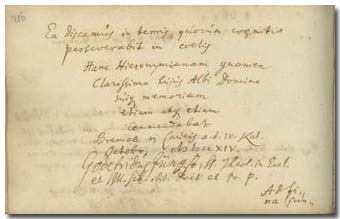
Ea discamûs in terris, quorum cognitis perseverabit in coelis. *
Hanc Hieronymianam gnomen Clarissimo hujus Albi Domino suique
memoriam etiam atque etiam commendabat

Godefridus Jüngst SS. Theol. in Eccl[esia] et Ill[ustri] Sch[ola]
ibid. Doct. et pr. p.
[written through pp. 216-217 with the same hand:]
Ad fi-/nes pagi-
na jun-/git.
|
* St. Jerome, Synopsis Bibliothecae
divinae, Apocalypsis Joannis (PL 28.145)
|
|
|
Let us learn in the earth those things, whose knowledge will also
follow us in the heavens. *
With this adage of St. Jerome I want to
recommend myself again and again into the memory of the eminent
owner of this album
In Bremen, the 4th day before the calends of
October 1714
Gottfried Jüngst, doctor of theology and pastor
of the illustrious school in the same city
[written through
pp. 216-217:] These pages will forever bind [us].
|
p.
216. Bremen, September 28, 1714
Jüngst, Gottfried
(1665-1726), German Reformed
theologian
Gottfried Jüngst was born in Herborn on October 19, 1665,
a son of Johann Ludwig J. town assessor. He learned in Herborn,
then he attended theology under Matthias Nethenus
(1618-1686) and Johannes Melchior (1646-1689). Due to their
influence Jüngst became an important representative of Cocceian
thought. In 1686 he disputed under the chairmanship of Nethenus,
and in 1687 he became pastor in Ballersbach (Dillenburg district).
In 1690 he was assistant pastor in Herborn. In 1688 he married
Margarete Christine, daughter of the pastor of Ballersbach Johann
Jakob Rückert. In 1692 he was invited professor of theology to the
academy of Hanau, and in 1701 he became supervisor of the diocese
of Hanau. In 1697 he obtained doctorate of theology in Marburg.
From 1706 he was pastor of St. Ansgar in Bremen, and from 1707
until his death professor of the academy. He was an outstanding
homiletician, and an eminent representative of both practical and
theoretical theology. He published sermons and academic disputes.
Our Library conserves the dissertation Christus Sacerdos altior coelis
factus by Wilhelm Heinrich Manger (Bremen, 1710), defended
under the chairmanship of Gottfried
Jüngst. He died in Bremen, on August 25, 1726.
Gottfried Jüngst, pastor of the St. Ansgar in Bremen wrote in the
album on September 28, 1714 on the page facing the note of his
colleague Ludwig Georg Treviranus, pastor of Bremen-Neustadt
(p. 217). His brief sentence written
through the two pages – Ad fines pagina jungit – probably refers
to their friendly relationship. The dating includes a reference to
the name of Cauci – the German tribe that had lived in this region
– similarly to the note of Theodor von Hase (p.
225).
•
ADB • DBA I 613: 22-32 • DBI • Jöcher-Adelung • Rotermund •
Strieder VI 378, IX, XIV |

